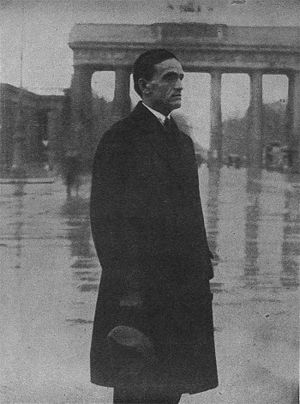Sunday
Aug102008
Vallejo, "Piedra negra sobre una piedra blanca"
 Sunday, August 10, 2008 at 16:52
Sunday, August 10, 2008 at 16:52 A work ("Black stone atop a white stone") by this Peruvian poet with whom I happen to share a birthday. You can read the original here.
 In Paris I shall die and it shall rain,
In Paris I shall die and it shall rain,
Its memory I hold, a downpour's thrall.
In Paris I shall die and shall not strain,
Perhaps on one fine Thursday in the fall.
A Thursday, like today is Thursday, yet
My humeri betray me as I write;
I see myself alone, my path unmet
Through every angle of my spinning sight.
Vallejo died, they beat him dead, he's dead,
Although to them he, César, did no wrong.
They hit him hard, with sticks as hard as lead,
With rope they hurt him more, yet some looked on:
My Thursday days, these humeri my bones,
My solitude, my rain, my path alone.

Reader Comments (3)
Who translated this? It's really pretentious. I understand that it is difficult to translate a text. And we probably can't approximate the Spanish meaning to English. That Being Said: I think the beauty of Vallejo's poem is it's (UN-wordy & sincere) simplicity. How can one NOT sound melodramatic & retarded with so few words? He does it beautifully. This translation is too wordy &...to use an untranslatable Spanish term "rebuscado"(in other words; like you're looking for fancy words to sound clever over overly educated)
This is my version:
Black Stone Over a White Stone
I shall die in Paris, during a rainstorm,
On a day I already remember.
I shall die in Paris and I don’t run from it
perhaps on a Thursday, like today, in autumn.
It shall be a Thursday, because today, Thursday
As I put down these lines, I have gotten up to put these old bones on in a foul mood.
Never like today have I turned,
gazed on my whole path, to see myself so alone.
César Vallejo is dead. They struck him,
All of them, though he did nothing to them,
They hit him hard with a stick, I'm telling you, hard
With the end of a rope also. Witnesses are: Thursdays,
old bones, loneliness, the rain, and paths...
Hello Dan
All translations and reviews -- in fact, every last word that appears on Deeblog -- are my own work. There are many ways to translate a poem, including a literal translation such as yours, which makes it a translation but not much of a poem.
For centuries poets have exercised poetic license in rendering foreign verse into their native tongues while still imbuing these works with similar poetic value. If you know English poetry, you will hardly find anything in my translation out of place. The words convey the three things any (good) poem should have: sense, sound, and image. It is impossible -- I repeat, impossible -- to translate a foreign poem into a good English poem if you are not thoroughly steeped in English poetry.
As to your claim that the sense in Spanish cannot be conveyed, I wholeheartedly disagree. English does not have grammatical gender, which means it does not have the luxury of rhymes with masculine endings, so the translator must be inventive. My scheme is simple enough, the images are sparklingly clear, and while there is a music in the English quite distinct from the Spanish you can almost hear some of the incantations whistling beneath the Parisian winds.
Finally, "rebuscado" is hardly "untranslatable": it exists in many languages, including English, and is actually calqued from the French (recherché). In fact, very little is untranslatable if you possess a very wide swath of learning, are open-minded and imaginative, and understand the interconnection of languages and literary traditions. Or you can always opt for the plain and literal translation and hope for plain and literal readers. Thanks again for your comments.
Best wishes,
Hadi